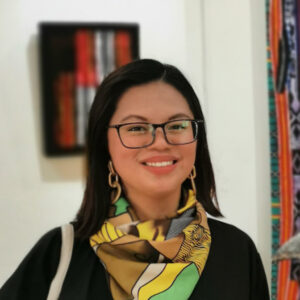
From the curator:
Karminn and her collaborators use the form of a multimodal scrollytelling website to weave together a verdant landscape filled with voices of the Isnag elders, youth, and the Apayao River. The river is our guide, winding us through the story of indigenous relationships with the land and their resistance to the construction of the Gened I and II dams in Kabugao. Patient, reflective, and attuned to the world around it, it is also a reflection of the yarning methodology adopted by the storytellers in working with the community and gathering their stories.
From the storyteller:
Resistance is nothing new to Indigenous peoples. It forms part of what sustains their peoplehood and their struggle for self-determination. A product of historical processes defined largely by displacement, indigeneity is a label imbued with power. It goes beyond the cultural and linguistic, and is equally a legal and political identity.
The Isnag of Kabugao are one of the many Indigenous peoples in the Philippines suffering from scores of structural oppression. The material bases of their identity – their land and their water – are threatened by an impending dam construction. Though laws require the free, prior, and informed consent of affected Indigenous communities before the implementation of extractive projects like megawatt dams, the state agency mandated to safeguard such rights has seemingly set aside the Isnag’s non-consent.
Emerging from the margins, this adodit is a tapestry of voices of resistance, resurgence, and reparation. If it can unsettle the prevailing comfortable assumptions on Indigenous peoples in the margins and in effect, contribute to the strengthening of their collective action, then it would be a meaningful, beautiful output transcending generations. This is a narrative of the community’s assertion of their rights, which highlights how intergenerational equity can fuel a people’s struggle.
Community partners:
The Isnag of Kabugao through Kabugao Youth (Jillie Karl Basan, Jann Alexis Lappas, Ma. Angelica Umingli)
Community elders:
Warling Maludon, Roldan Apilit, Angel Umingli, Cariaga Pallat, Budin Balalang
Field partner:
Joao Paulo D. Reginaldo
Translator:
Kalea Adrienne Aquino
Collaborators whose contributions are indispensable to this project, but whose safety and security require anonymity.

Karminn C.D. Daytec Yañgot, a Kankana-ey Igorot, is an anthropologist by passion and a development worker by profession. She teaches anthropology at the University of the Philippines, where she concurrently earns her PhD in Indigenous Studies. Her research and development work focus on human rights and structural oppression, Indigenous peoples and indigeneity, sustainable communities, political representation, and policy development. On the side, she tends her plants, collects ceramics, and tries her hand at vulnerable writing.
